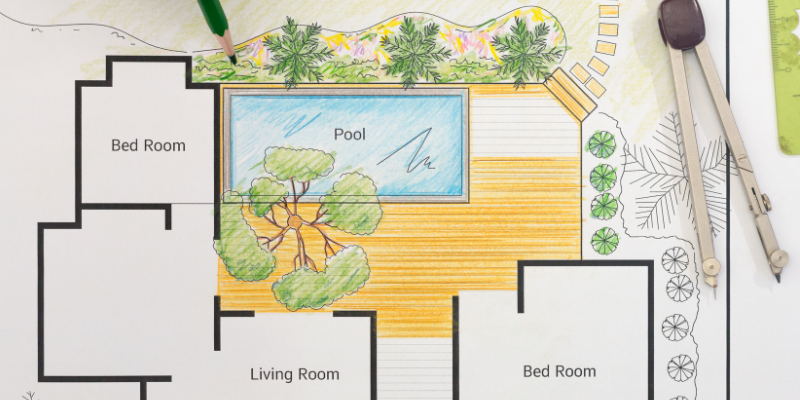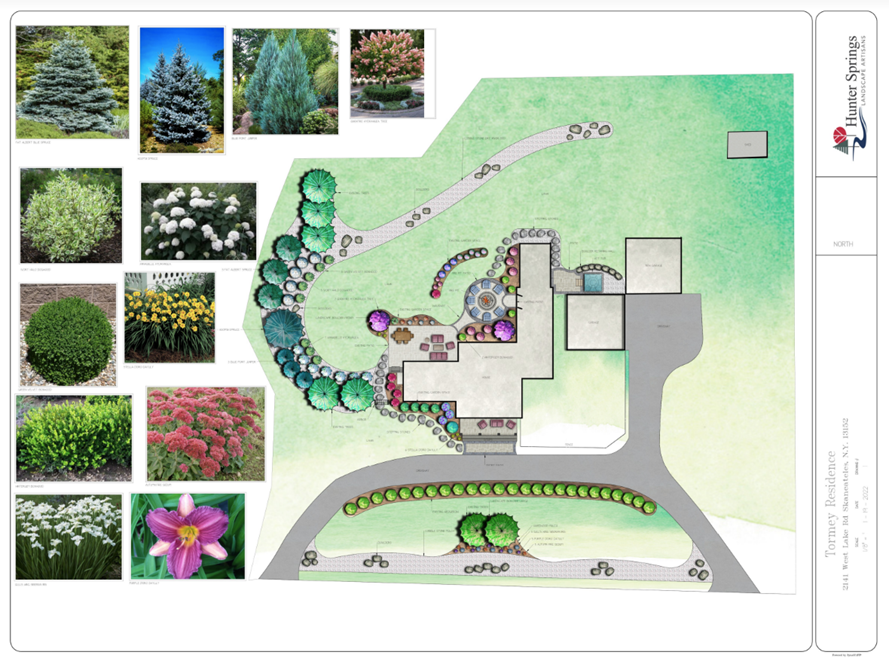Are You Looking to Hire a Landscape Designer or a Landscape Architect? We'll Help You Decide Which Profession is Best for Your Next Project.
Not sure whether you need a landscape designer or an architect for your project? It depends on several factors, like the size and complexity of the project. Here’s a comparison of the two professions to help you decide which is best for you.

What Do Landscape Designers Do?
Landscape designers are the experts in charge of planning, designing, and managing the construction and installation of landscapes. They also provide maintenance and landscape care services after the project is completed. Talented landscape designers create a blueprint for a beautiful, functional, and sustainable outdoor area that meets the client’s specific needs and preferences.
Landscape designers typically focus on the aesthetic aspects of design, softscapes (plant selection and placement), hardscaping features, lighting, and other elements that contribute to the overall look and feel of the space. They may also provide guidance on irrigation and other functional considerations. Depending on their training and experience, landscape designers may also be able to provide advice on more technical aspects of landscape design, such as grading and drainage.
Projects like outdoor entertainment areas, patios, custom pools and water features, and garden designs are typically suited for a landscape designer.
What Qualifications Do Landscape Designers Need?
There are no formal education requirements for landscape designers, although most have at least an associate’s degree in landscape design or a related field. Many landscape designers also have certification from professional organizations, such as the Association of Professional Landscape Designers (APLD) or the American Society of Landscape Architects (ASLA). These credentials can demonstrate a commitment to ongoing education and professional development, which is important when entrusting someone with your outdoor space.
What Types of Projects Do Landscape Design Firms Take On?
Landscape design firms typically take on a wide range of projects, from small residential gardens to large commercial properties. The size and scope of the project will dictate the number of designers involved and the level of detail required. For example, a simple garden redesign may only require one or two designers, while a more complex commercial project may require an entire team of designers working together.
Do Landscape Designers Design and Build?
Some landscape designers also offer landscape construction services, but not all do. If you’re looking for a one-stop-shop for your landscape design and build project, be sure to ask if the firm you’re considering offers both services. Keep in mind that even if a firm does offer both landscape design and construction services, it’s still important to carefully review their qualifications and experience to ensure they’re up to the task.
What Should I Consider When Hiring a Landscape Designer?
While there are many things to think about when hiring a landscape designer- such as their qualifications, experience, and design style- it is important to remember that, similar to art, each landscape will be creative and unique.
You should also make sure that they are comfortable working with your budget and have a clear understanding of your project goals. It’s also a good idea to ask for examples of their previous work to get an idea of their design sensibility and see if it aligns with your own.
A company's reputation and team experience are key to ensuring that your project will be managed using only the best practices in the business. Get to know the company you will hire by visiting their website, reading reviews, asking for references, and learning about their leadership team.

What Do Landscape Architects Do?
Landscape architects are trained in both the art and science of landscape design. In addition to focusing on the aesthetic aspects of design, they also consider the functional aspects, such as grading and drainage, site selection and analysis, construction details, and plant ecology. They may also provide guidance on land-use planning and zoning regulations.
Projects that involve complex site issues, large-scale land planning, or require detailed construction drawings are typically better suited for a landscape architect.
What Qualifications Do Landscape Architects Need?
Landscape architects are licensed professionals who have completed a four-year undergraduate degree in landscape architecture, as well as a two- or three-year master’s program. In addition to completing formal education, most states also require landscape architects to pass a licensing exam. Landscape architects are trained in the principles of design, horticulture, and land use planning. They also have experience with various drafting and computer-aided design (CAD) software programs.
What Types of Projects Do Landscape Architects Take On?
A landscape architect creates beautiful outdoor spaces. The profession’s focus is on master planning, site planning, landscape design, project management, and implementation.
Projects can range from very small to very expansive residential, neighborhood parks and golf courses, to regional recreation, environmental, transportation, educational, commercial, institutional, and industrial projects.
Do Landscape Architects Design and Build?
Although landscape architects don't personally complete the hard labor, they oversee the work of the contractors/workers ensuring they execute the vision correctly. A large part of their job is coming up with a concept for the outdoor space and then drawing plans in detail so anyone can understand them.
Landscape architects frequently work with engineers, architects, surveyors, community planners, biologists, and other specialists to ensure the project runs efficiently.
What Should I Consider When Hiring a Landscape Architect?
When hiring a landscape architect, you should consider their qualifications, experience, and design style. You should also make sure that they are comfortable working with your budget and have a clear understanding of your project goals.
Hiring the finest business for your project is vital, so look for proposals from a few different companies. Make sure to go over their portfolios, contracts, and any other elements that are relevant to the outcome of your project, such as deadlines, budgets, materials, and communication.
One of the best perks of working with a licensed landscape architect is that they have the ability to legally stamp plans, which means they accept legal responsibility if something on the project fails, like a retaining wall. This is an added protection for the client in the case that the project fails in some way.
How Do I Know If I Need a Landscape Designer or a Landscape Architect?
There are several criteria to consider before deciding whether to hire a landscape designer or architect. Qualified landscape design businesses can handle small and large projects on both the residential and commercial sides. If the tasks require significant land-use planning, zoning rules, or site study, they may be better suited for an architectural team.
So, which one would you need? If you're not sure, it's usually a good idea to get input from both types of experts on your specific project. This way, you'll be able to make an informed decision about which one is best for your needs. Our team here at Hunter Springs Landscape Artisans would love to be a resource for you as you start to plan your project. Our talented staff has a full range of capabilities and expertise.
